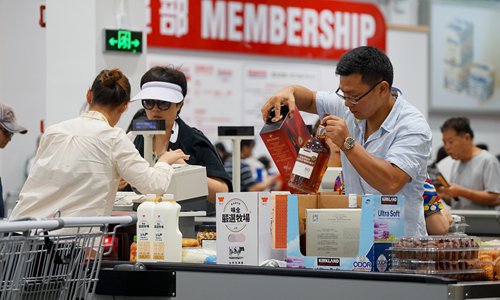HOME >> BUSINESS
Costco model to take root in China: analysts
By Du Qiongfang in Shanghai and Zhang Hongpei in Beijing Source:Global Times Published: 2019/8/28 22:42:02

Consumers pay for their products at the checkout counter in Costco on Wednesday in Shanghai. Photo: Chen Xia/GT
The shopping craze at the first physical store of US retail giant Costco in the Chinese mainland will not last long, but its business model featuring large warehouses and a membership system is likely to flourish in China amid a consumption upgrade, analysts told the Global Times.Costco announced on its second business day that its first mainland store will limit the number of members entering the warehouse to 2,000, effective Wednesday, amid frenzied shopping by local consumers.
Due to safety concerns, Costco said it will phase in traffic controls from Wednesday.
"Local police will assist in improving traffic in the area in order to lessen the disturbance to our neighbors, and we have improved our internal guest-flow system," the company said in a statement on its WeChat account.
An employee of the store told the Global Times on Wednesday that "The number of consumers who visited the store was about one-third" of the number on Tuesday, the opening day.
The US warehouse retailer officially opened Tuesday morning in the Shanghai suburban Minhang district. Within four hours of opening, thousands of Chinese consumers flooded the store. It was then shut down at about 2:40 pm, hours before its scheduled closing time, due to heavy traffic flow.
Another employee of Costco told the Global Times that as many as 130,000 people had signed up for store memberships as of Monday night.
One of the most popular products among Chinese consumers is the luxury liquor Kweichow Moutai. Its Moutai Flying Fairy, with 53 percent proof, is a hot product that is hard to get on the market. Having been speculated by scalpers these past years, its price has risen as high as 3,000 yuan ($419.12) per bottle, compared with its 1,498-yuan price tag in Costco.
Roughly 100 bottles of Moutai Flying Fairy were displayed in the store on Tuesday and sold out within minutes. "There is no replenishment today," a staff member in the liquor section told the Global Times on Wednesday.
Most customers interviewed by the Global Times in the store said that the food sold in Costco is fresh and cheap, as the price is almost the same as the price in overseas markets if the yuan had been converted to US dollars or Australian dollars.
A shopper surnamed Ma told the Global Times on Wednesday that the red wine he selected is 50 yuan cheaper per bottle at around 450 yuan compared with other stores. He bought a dozen bottles of the wine.
"At least 40 percent of the merchandise in Costco is imported," an employee said.
Costco made its first foray into the Chinese mainland in 2014, when it launched online sales. Founded in 1976, Costco is the world's first store to use a membership system.
"The business model of Costco has a market in China and will expand to other Chinese cities given its novelty for most domestic consumers," said Zhang Yi, CEO with Shenzhen-based iiMedia Research.
Zhang told the Global Times on Wednesday that unlike ordinary supermarkets, Costco is attractive because of the successful application of its membership system. The strong purchasing power of Chinese consumers also supports the retail industry's renovation and development.
Zhang said that the price advantage cited by Shanghai consumers might not be Costco's long-term strategy because lower prices are mainly used to attract consumers in the initial period.
"A membership system helps consumers become more familiar with a store brand but it is only one of the many means. It is only premium goods and satisfactory services that can sustain the store," Zhang noted.
The vast market potential in China's second- and third-tier cities may attract Costco, based on the current consumption trend, he added.
Posted in: COMPANIES